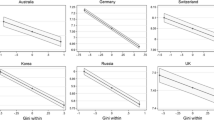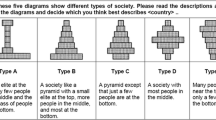Abstract
In this paper, the concept of Income Satisfaction Inequality is operationalized on the basis of individual responses to an Income Satisfaction question posed in the German Socio-Economic Panel (GSOEP). Income satisfaction is the subjective analogue of the objective income concept. The paper introduces a method to decompose Income Satisfaction Inequality according to the contributions from variables such as income, education, and the number of children. Given the panel structure of the data, inequality may be attributed partly to permanent individual circumstances and partly to transitory changes. The paper shows that by far the largest part of the satisfaction inequality has to be ascribed to unobserved heterogeneity. Distinguishing between a structural and an unexplained part of inequality we find that income explains the largest part of structural Income Satisfaction Inequality together with household membership; for non-working individuals, the age distribution is very relevant as well.
Similar content being viewed by others
References
Aitchison, J. and Brown, J.A.C.: The Lognormal Distribution, Cambridge University Press, London, 1960.
Argyle, M.: Causes and correlates of happiness, In: D. Kahneman, E. Diener and N. Schwarz (eds.), Well-Being: The Foundations of Hedonic Psychology, Russell Sage Foundation, New York, 1999, Chapter 18.
Atkinson, A.B.: On the measurement of inequality, J. Econom. Theory 2 (1970), 244–263.
Atkinson, A.B. and Bourguignon, F. (eds.): Handbook of Income Distribution, North-Holland, Amsterdam, 1999.
Baker, M.: Growth-rate heterogeneity and the covariance structure of life-cycle earnings, J. Labor Economics 15 (1997), 338–375.
Brickman, P. and Campbell, D.T.: Hedonic relativism and planning the good society, In: M.H. Apley (ed.), Adaptation-level Theory: A Symposium, Academic Press, New York, 1971, pp. 287–302.
Cantril, H.: The Pattern of Human Concerns, Rutgers University Press, New Brunswick, 1965.
Clark, A.E. and Oswald, A.J.: Unhappiness and unemployment, Economic J. 104 (1994), 648–659.
Clark, A.E. and Oswald, A.J.: Satisfaction and comparison income, J. Public Economics 61 (1996), 359–381.
Cowell, F.A.: Measurement of inequality, In: A.B. Atkinson and F. Bourguignon (eds.), Handbook of Income Distribution, North-Holland, Amsterdam, 1999.
Dalton, H.: The measurement of the inequality of incomes, Economic J. 30 (1920), 348–361.
Dickens, R.: The evolution of individual male wages in Great-Britain: 1975- 1995, The Economic Journal 110 (2000), 27–49.
Diener, E. and Lucas, R.E.: Personality and subjective well-being, In: D. Kahneman, E. Diener and N. Schwarz (eds.), Well-Being: The Foundations of Hedonic Psychology, Russell Sage Foundation, New York, 1999, Chapter 11.
Diener, E., Suh, E.M., Lucas, R.E. and Smith, H.L.: Subjective well-being: Three decades of progress, Psychological Bulletin 125 (1999), 276–302.
Di Tella, R., MacCulloch, R.J. and Oswald, A.J.: Preferences over inflation and unemployment: Evidence from surveys of happiness, American Economic Review 91 (2001), 335–341.
Easterlin, R.A.: The worldwide standard of living since 1800, The Journal of Economic Perspectives 14 (2000), 7–26.
Ferrer-i-Carbonell, A.: Income and well-being: An empirical analysis of the comparison income effect, Tinbergen Institute Working Paper 2002–019, 2002.
Ferrer-i-Carbonell, A. and Van Praag, B.M.S.: The subjective costs of health losses due to chronic diseases. An alternative model for monetary appraisal, Health Economics 11 (2001), 709–722.
Fields, G.S.: Accounting for income inequality and its change: A new method, with application to the distribution of earnings in the United States, Research in Labor Economics (2002), forthcoming.
Friedman, M.: A Theory of the Consumption Function, Princeton University Press, Princeton, NJ, 1957.
Frey, B.S. and Stutzer, A.: Happiness, economy and institutions, Economic J. 110 (2000), 918–938.
Frijters, P.: Do individuals try to maximize general satisfaction? J. Economic Psychology 21 (2000), 281–304.
Gini, C.: Variabilita e Mutabilita, Bologna, Italy, 1912.
Helson, H.: Adaptation level as frame of reference for prediction of psychological data, The American Journal of Psychology 60 (1964), 1–29.
Hunt, J.: Determinants of non-employment and unemployment durations in East Germany, NBER Working Paper Series No. 7128, Cambridge, MA, 1999.
Hunt, J.: Why do people still live in East? The Institute for the Study of Labor (IZA) Discussion Paper No. 123, Bonn, Germany, 2000.
Kahneman, D., Diener, E. and Schwarz, N. (eds.): Foundations of Hedonic Psychology: Scientific Perspectives on Enjoyment and Suffering, Russel Sage Foundation, New York, 1999.
Kapteyn, A. and Van Herwaarden, F.G.: Independent welfare functions and optimal income distribution, J. Public Economics 14 (1980), 375–397.
Likert, R.: A technique for the measurement of attitudes, Archives of Psychology 140 (1932), 55.
Lillard, L. and Willis, R.: Dynamic aspects of earnings mobility, Econometrica 46 (1978), 985–1012.
Mundlak, Y.: On the pooling of time series and cross section data, Econometrica 46 (1978), 69–85.
Ng, Y.-K.: A case for happiness, cardinalism, and interpersonal comparability, The Economic J. 107 (1997), 1848–1858.
Pannenberg, M.: Documentation of sample sizes and panel attrition in the German Socio Economic Panel (GSOEP), Discussion Paper No. 150, Deutsches Institut fürWirtschaftsforschung, Berlin, 1997.
Plug, E., van Praag, B., Krause, P. and Wagner, G.: Measurement of poverty: Exemplified by the German case, In: N. Ott and G.G. Wagner (eds.), Income Inequality and Poverty in Eastern and Western Europe, Physica-Verlag, Heidelberg, 1997, pp. 69–89.
Rao, C.R.: Linear Statistical Inference and its Applications, Wiley, New York, 1973.
Sen, A.K.: On Economic Inequality, Clarendon Press, Oxford, 1973. Reprinted 1997.
Sen, A.K.: The possibility of social choice, American Economic Review 89 (1999), 349–378.
Silber, J. (ed.): Handbook on Income Inequality Measurement, Kluwer Academic Publishers, Dordrecht, 1999.
Theil, H.: Economics and Information Theory, North-Holland, Amsterdam, 1967.
Theil, H.: The measurement of inequality by components of income, Econom. Lett. 2 (1979), 197–199.
Van Praag, B.M.S.: The welfare function of income in Belgium: An empirical investigation, European Economic Review 2 (1971), 337–369.
Van Praag, B.M.S.: The perception of income inequality, In: W. Krelle and A.F. Shorrocks (eds.), Personal Income Distribution, North-Holland, Amsterdam, 1978, pp. 113–136.
Van Praag, B.M.S.: Ordinal and cardinal utility: An integration of the two dimensions of the welfare concept, J. Econometrics 50 (1991), 69–89.
Van Praag, B.M.S., Frijters, P. and Ferrer-i-Carbonell, A.: The anatomy of well-being, J. Economic Behavior and Organization 51 (2003), 29–49.
Wagner, G.G., Burkhauser, R.V. and Behringer, F.: The English language public use file of the German socio-economic panel, J. Human Resources 28 (1993), 429–433.
Author information
Authors and Affiliations
Rights and permissions
About this article
Cite this article
Ferrer-i-Carbonell, A., Van Praag, B.M. Income Satisfaction Inequality and its Causes. The Journal of Economic Inequality 1, 107–127 (2003). https://doi.org/10.1023/A:1026109706836
Issue Date:
DOI: https://doi.org/10.1023/A:1026109706836




